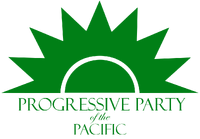| Progressive Party of the Pacific Prógɚesív Páɚtë wf ŧé Pásífíx | |
 | |
| Founded | 26 January 2009 |
| Ideology | Democratic socialism Social democracy Progressivism |
| Fiscal position | Leftist |
| Social position | Far-Left |
| Chairman Nominal leader | Zachary Hudgins Ray Matveyev |
| Headquarters | Seattle, Pacifica |
| Official colors | Green |
| Seats in the - National Assembly | 420 of 874 (47.95%) |
| Website | progressives.pr |
The Progressive Party of the Pacific is currently the largest and ruling party in the Democratic Republic of the Pacific. It is the largest party in terms of membership, boasting a claimed 560,000 members. Growing out of the Pacifican Independence Movement, the party was one of the first formal political groups to support Pacifican independence and agitate early nationalism.
Since the birth of the Pacifican Republic, the Progressive Party has taken a leadership position in much of the Republic's politics. Led by President Ray Matveyev, the Party has attained international recognition, with similar parties established elsewhere in the former United States.
It is the leading member of the Pacifican Independence Movement political bloc.
History[]
The Pacifican Independence Movement was originally founded as the organization to spearhead the secessionist movement within Washington State to break away from the United States due to the collapsing economy at that time. The organization successfully staged a recall election of Washington governor Christine Gregoire and campaigned successfully to elect its leader, Ray Matveyev, as the new state governor. When Washington declared its independence, the Movement broke with its political wing, headed by Matveyev, when it rejected offers from the Republic of California to form a political union. Then-President of the Republic of Washington Ray Matveyev declared the Progressive Party to be the succeeding organization to the Indepdence Movement as it lobbied for inclusion into California. When the country did split and most of the former Washingtonian counties joined California, Matveyev and the Progressives stood their ground and formed the Provisional Republic of Puget Sound. As such, the Pacifican Indepdence Movement was dissolved into the larger National Republican Party of California.
Ideology[]
The Progressive Party of the Pacific support "liberal" and "progressive" political positions (referring to social liberalism). The party has favored workers, labor unions, religious and ethnic minorities, and same-sex couples and homosexuals. The party has advocated welfare spending programs targeted at the poor. Progressives have also supported environmentalist movements to protect the wildlife and habitats of the Pacific Northwest, such as the return of the salmon.
They have also recently supported the nationalization of several industries and businesses in the Pacifican Republic in order to ensure effective government regulation and state-wide benefits from their profits. The creation of the Ministry for Commercial Administration and the Nationalization Act of 2009 was supported by the Progressives and President Matveyev. Formerly strictly neutral, in the wake of the Pacifican War the Progressives supported a defensive strategy in geopolitical warfare, such as with the establishment of the Pacifican Organization for Mutual Cooperation (POMAC).
Relations with California has improved since the Pacifican War, before the Progressive Party advocated for more isolationist policies with California. Now the party is working with the Californian-ruling National Republican Party to build west-coast relations.
Structure[]
Nationally[]
The Progressive Party is lead by the National Office, located in Seattle. The party is led internally by the Chairperson of the Central Committee, however its top-ranking official is called the nominal leader. The nominal leader is the highest ranking official of the party in the Pacifican government, who is currently President Ray Matveyev.
The National Office hosts the national Central Committee of the Progressive Party of the Pacific, modeled like the Council of Ministers. The national committee operates seven offices: Media Affairs, Inner-Party Affairs, Financial Affairs, Government Affairs, Police Affairs, Bureau Affairs, Campaign & Electoral Affairs, as well as seven other members without formal portfolio.
The party's national legislature is the National Representative Committee, which hosts five delegates from each parish bureau. The committee meets twice every year to ratify national policy decisions and the party platform.
Parish[]
Party branches for parish-wide affairs are called bureaus (like the Progressive Party Bureau for the Parish of Seattle). Each bureau is led by a deputy chairperson, whom all are a deputy to the national Chairperson of the Central Committee.
Bureaus operate a General Committee, like the national Central Committee, it handles day-to-day affairs of the party. Bureaus host six (and six without portfolio) committee members: Media Affairs, Financial Affairs, Campaign Affairs, Government Affairs, Local Affairs, and Congressional Policy Affairs.
It's legislature is the Delegate Committee, which consists of all party members of that parish.
Local[]
Branches in incorporated cities are called chapters (like the Progressive Party Chapter for the City of Bellevue). Each chapter is led by a Secretary-General, and below that, the Lieutenant Secretary. Its central committee is called a City Administration Committee, and has five members: Media Affairs, Financial Affairs, Campaign Affairs, Local Government Affairs, and Recruitment Affairs.
Its legislature is the Chapter People's Council, consisting of all party members in the chapter's city.
| |||||||
 This Pacifican Republic-related article is a stub. Help Cyber Nations Wiki by expanding it.
This Pacifican Republic-related article is a stub. Help Cyber Nations Wiki by expanding it.